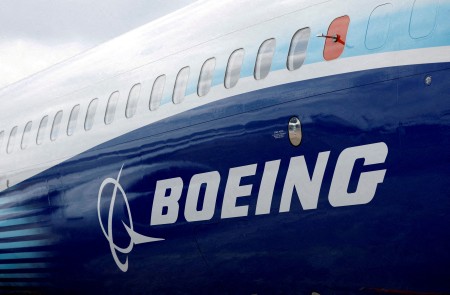By Tim Hepher and Lisa Barrington
DUBAI (Reuters) – The next CEO of Boeing should have an understanding of what led to its current crisis and be prepared to look outside for examples of best industrial practices, the head of the International Air Transport Association said on Sunday.
U.S. planemaker Boeing is engulfed in a sprawling safety crisis, exacerbated by a January mid-air panel blowout on a near new 737 MAX plane. CEO Dave Calhoun is due to leave the company by the end of the year as part of a broader management shake-up, but Boeing has not yet named a replacement.
“It is not for me to say who should be running Boeing. But I think an understanding of what went wrong in the past, that’s very important,” IATA Director General Willie Walsh told Reuters TV at an airlines conference in Dubai, adding that Boeing was taking the right steps.
IATA represents more than 300 airlines or around 80% of global traffic.
“Our industry benefits from learning from mistakes, and sharing that learning with everybody,” he said, adding that this process should include “an acknowledgement of what went wrong, looking at best practice, looking at what others do”.
He said it was critical that the industry has a culture “where people feel secure in putting their hands up and saying things aren’t working the way they should do”.
Boeing is facing investigations by U.S. regulators, possible prosecution for past actions and slumping production of its strongest-selling jet, the 737 MAX.
‘RIGHT STEPS’
Calhoun, a Boeing board member since 2009 and former GE executive, was brought in as CEO in 2020 to help turn the planemaker around following two fatal crashes involving the MAX, its strongest-selling jet.
But the planemaker has lost market share to competitor Airbus, with its stock losing nearly 32% of its value this year as MAX production plummeted this spring.
“The industry is frustrated by the problems as a result of the issues that Boeing have encountered. But personally, I’m pleased to see that they are taking the right steps,” Walsh said.
Delays in the delivery of new jets from both Boeing and Airbus are part of wider problems in the aerospace supply chain and aircraft maintenance industry complicating airline growth plans.
Walsh said supply chain problems are not easing as fast as airlines want and could last into 2025 or 2026.
“It’s probably a positive that it’s not getting worse, but I think it’s going to be a feature of the industry for a couple of years to come,” he said.
Earlier this year IATA brought together a number of airlines and manufacturers to discuss ways to ease the situation, Walsh said.
“We’re trying to ensure that there’s an open dialogue and honesty,” between them, he said.
(Reporting by Tim Hepher and Lisa Barrington in Dubai; Editing by Hugh Lawson and Andrew Cawthorne)













